
Length is important by Ian Woolf and Peter Eisler
The meeting started with a discusssion of how to get people back
into reading science fiction rather than just looking at it, and
a demand to know why Ron had muted our mule when editing the
title of our last article. Ron suggested a magazine with short
stories and novellas and having the main story written for
instance in the Star Trek universe. At this point, David read us
chapter and verse on the lineage of Novels, Novellas and
Novellettes (not knowing as we do that they mean Mr, Mrs and Miss
in esperanto). The argument that length was important was
winning, until German and Italian Romantics came into the
picture.
Basenji-adoptee Gary was ambushed every time he tried to open his
mouth to contribute to the discussion, so he passed around
photocopies of his Basenji. This quieted everyone as they
tried to understand why they were looking at this carefully
folded bit of paper and passing it along, with the exception
of the few members who had attended the Other Dimensions meeting,
who laughed out loud.
Susan explained that Absolute Magnitude (nee Harsh Mistress)
should be a Jenny Craig weight loss magazine. Mark declared that
CJ Cherryh is huge. Graham again explained he is in
correspondance with a magazine collector who, if its a magazine,
collects it. Brian revealed that the original Director's Cut of
the Stallone movie "Judge Dredd" contained the Sex-shop scenes
cruelly cut from the present release.
Graham declared that he was not aware of any science
fiction stories relating to Trees. Members were amazed that he
had missed out on the Day of the Triffids, The Integral Trees,
The Word For World Is Forest, The Man In The Tree, and all the
other well know stories in the important Tree sub-genre. Ian
proposed that the meeting after next be on the topic of Trees in
science fiction.
Brian reported that the Vatican would no longer accept applicants
for the priesthood who were allergic to Christ. The Catholic
Church has abolished transubstantiation, once the only
present-day miracle still acknowledged by the modern Church. As a
result, people who suffer from allergic digestive ailments or
alcoholism are now barred from the priesthood as they are no
longer magically protected from the gluten in the bread by having
it miraculously turn into the flesh of Yeshua ben Yosef, and the
alcohol transforming into his blood. A story where a priest
genuinely finds human flesh and blood in his Chalice is being
held by Harlan Ellison for the next collection of his "Dangerous
Visions" series. Ransom has not been discussed. Gary explained
that St Petersburg was a nice setting for cannibalism as the
police had other fish to fry.
Locus science fiction magazine asked what books you would take on
a desert island. Peter suggested the complete works of Isaac
Asimov so that you could build a bridge to the mainland, or
barring that, a book on surviving on a desert island. Locus's
next question was which author you would bring with you. Many
suggestions were listed, from Asimov to Shakespeare. It was
pointed out that all of these people were dead. Peter pointed out
that this was a bonus, as dead authors ate less and could be used
for emergency rations. Death has not slowed the output of many
authors, it was noted that Asimov and Hubbard are still releasing
new books. Mark reported that posthumous collaboration of Isaac
Asimov and L Ron Hubbard could be expected. One of the other dead
authors listed was Anthony Trollope, which Mark found to be a
strange choice for Locus. Peter pointed out that trollops were
always welcome on a desert island.
Pictures from the Roswell Incident film were passed around,
and the absence of certain physical features on the "female
alien cadaver" prompted some profound questions. (Not, "why do
little blue midgets hit me with fish?")
Susan immediately asked the deep evolutionary physiological
question; why do men have nipples? A discussion of lactating men
followed. This led to the discovery that the Rosswell alien, like
Adam, may have been of immaculate conception.
Discussing the topic was then discussed. The fact that the topic
of the rise and fall of civilsations - "The Long Night" was
altered by editor Ron in the Futurian #10 to refer erroneously to
Galactic Empires. It was reluctantly agreed that stories about
Earth were allowed. However, it was universally agreed that bad
post-apocolypse stories should be ignored.
Books disscussed:
Runestaff by Michael Moorcock
Post-apocolyptic Mask wearing Masonic Londoners hurt people.
A Canticle for Leibowitz by Walter M. Miller jnr
Civilisation is nutured by monks during a post-nuclear holocaust
who rediscover electricity.
Empire of the Atom by A E Van Vogt
Post-nuclear civilsation run by secret mutants.
World of Tiers series by Phillip Jose Farmer
A man who isn't who he thought he was explores the Worlds of
Tiers left from the fall of the Lord's civilisation.
Future History series by Robert Heinlein
Lazarus Long keeps living through the rise and fall and rise of
civilisation.
Eon and Eternity by Greg Bear
An asteroid city from the far future intervenes in the fall of�civilsation.
Foundation series by Isaac Asimov
A social scientist predicts the fall of galactic civilsation and
sets up some Foundations to make it only a Short Night.
The Long Night by Poul Anderson
The Polesotechnic League of merchant princes flowers and fades to
be succeeded by the Terran Empire which in turn succombs to
decadence, espionage and butlers until it also falls.
Stand on Zanzibar by John Brunner
Over-population and advanced drugs contribute to the world going to
hell except for one small nation, so they find out why.
Stone that Never Came Down by John Brunner
Civilisation starts to fall until a method of changing human
behaviour is spread by dissadents.
Rim World series by A Bertram Chandler
An Galactic civilisation arises on the Rim of the Galaxy where
the Laws of men and nature are spread thin, in the ashes of a
previous Galactic Empire.
Norstrilia series by Cordwainer Smith
Civilsation rises and falls and rises changing the nature of man
and beast such that we have more in common with the animals of
the future than with the new humans and their sick sheep.
Marching Morons by Cyril Kornbluth
Honest John solves the Moron problem for future geniuses.
Lord of Light by Roger Zelazney
After the fall of Earth, technology makes the Hindu religion the
True religion.
Galactic Empires edited by Brian Aldiss
Short stories about Galactic Empires.
Space Opera edited by Brian Aldiss
Short stories of Space Operas.
Nightfall by Isaac Asimov
Night falls and civilisation ends once again.
Blood by Michael Moorcock
Engineers drilling into the Ultimate Nature of Reality make a
mistake, and civilisation and Reality decline.
Stainless Steel Rat series by Harry Harrison
A thief is set to catch less clever criminals for the latest
esperanto Galactic government.
Book of the New Sun by Gene Wolfe
Freelance executioner wanders through the ruins of Earth.
Blakes 7
The future of the Star Trek universe, after the fall?
Dying Earth series by Jack Vance
In the Last Days bored Sorcerors and thieves battle and time
travel.
Armageddon 2419 by Nolan
Buck Rogers sleeps through the fall and rise of galactic
civilisation.
The Time Machine by HG Wells
Man travels through time observing.
Waterworld
Mad Max with gills.
The Giants series by James P. Hogan
Ancient human civilisation rises and destroys itself, leaving
evidence on the moon.
Monkey Planet by Pierre Boulle
Monkeys take over the planet.
The Practice Effect by David Brin
Civilisation falls and rises as a new physical law is unleashed.
Flux and Anchor series by Jack L. Chalker
Civilisation changes as Physical law becomes subject to those
with the stronger will.
Chronicles of Morgain by CJ Cherryh
A gate-closing swordswoman and friend use a vortex.
Planet of No Return series by Harry Harisson
Duo contact worlds lost in the last Fall of civilisation.
Dune series by Frank Herbert
Galactic Empire of drug-addicts arises after an anti-computer
dark ages.
Cthulhu Mythhos cycle by HP Lovecraft
The Old Ones dream us in their Long Night - our nightmare begins
when they awaken.
Pern series by Anne Macaffrey
Dragon-based economy develops after a world is shunned by the
Galactic civilisation.
Ringworld by Larry Niven
Civilsation falls after a superconductor-eating plague on the
Ringworld.
The Mote in Gods Eye by Larry Niven and Jerry Pournelle
Sex-addicted alien civilisation rises and falls due to
overpopulation.
The Warlock series by Christopher Stasheff
Democratic rebels escape despotic galactic government to set up
feudal society.
General series by SM Stirling and David Drake
Computer-assisted General conquers a helpless world left from
fall of a Galactic empire.
Spider World series by Colin Wilson
Giant spiders enlave humanity.
Battlefield Earth by L Ron Hubbard
Psychos stripmine Earth.
Lest Darkness Fall by L. Sprague De Camp
Time-traveler to ancient Rome modernizes it.
Bolo series by Keith Laumer
Giant tanks fight wars
Also mentioned but not read by us:
Last and First Men by Olaf Stapledon
War of the Air by HG Wells
Amtrack Wars by Patrick Tilley
Space Viking by H Beam Piper
The Pelbar cycle by PO Williams
City by Clifford Simak
Against a Dark Background by Iain M. Banks
Not a Culture novel
Hainish series by Ursula K LeGuin
The Stone God Awakens by Phillip Jose Farmer
Hyperion cantos by Dan Simmons
The Inquisitor series by S Suchartil
She by CS Forester
People attending the meeting:
Graham Stone
Eric Lindsay
Gary Dalrymple
Peter Eisler
Susan Smith
Mark Phillips
Brian Walls
Wayne Turner
Brett Clegg
David Ritchie
Duncan Smith (no relation)
Ian Woolf
Kevin Dillon
Ron Clarke










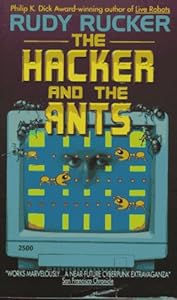
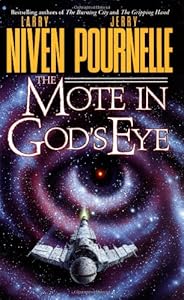
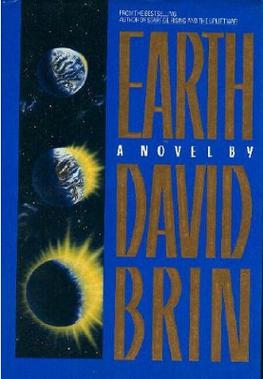

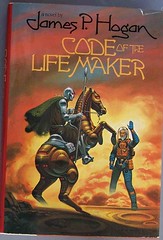

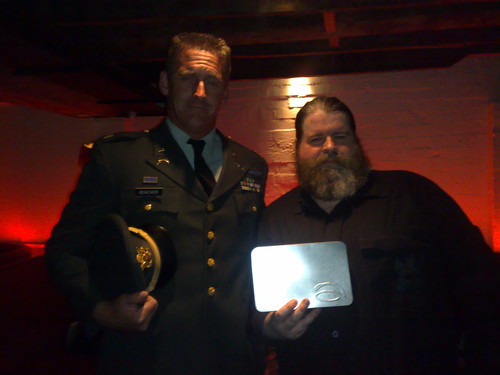
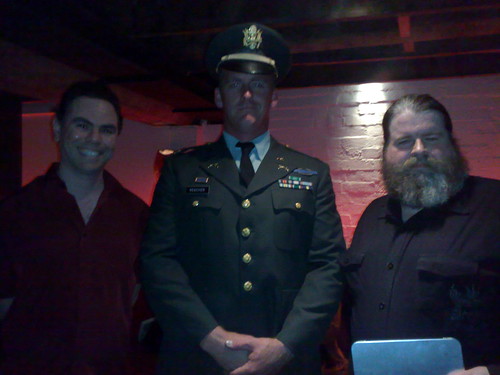
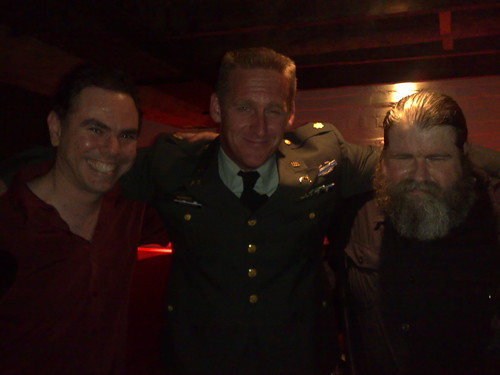
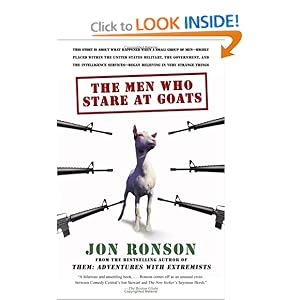













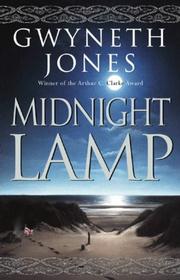

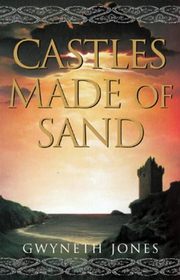








Recent Comments